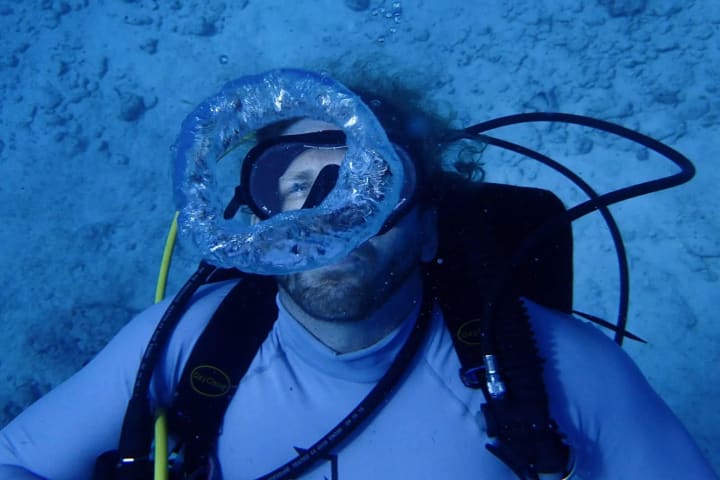
In an amazing adventure, a guy named Joseph Dituri spent 100 days living underwater off Key Largo, Florida. This set a new record and got people thinking about what happens to the body when you stay underwater for so long.
Joseph, a science whiz, did everyday stuff like eating, sleeping, and even teaching classes underwater. It's called "aquanautics," and people have been doing it since the '60s. But what does it do to your body, and how long can you actually live underwater?

Shoutout to Brilliant.org for helping out with this cool SciShow video! They're all about boosting your science and math skills, and if you're into that, you can try it free for 30 days and get 20% off an annual subscription at Brilliant.org/SciShow.
Besides breaking a world record, living underwater helps scientists understand how people might cope in tight spaces, similar to astronauts in space. It's like a practice run for future space trips, maybe even to Mars. Plus, with 75% of the ocean floor unexplored, living underwater is a sweet spot for doing research.
One place where scientists hang out underwater is the Aquarius research base near Key Largo. It's like an underwater lab where people stay for up to three weeks. In recent NASA studies there, scientists checked how being underwater for 9 to 10 days affects the body and mind.
Physically, the underwater folks had lower blood pressure, heart rate, and breathed slower than usual. Maybe it's because the air underwater is pressurized, making it a bit harder to breathe. They also lost weight, around 1.3 kilograms, for some reason. Scientists aren't exactly sure why, but it might have to do with the thicker air making them hungrier.
On the happiness side, despite a bit of stress before and during their underwater stay, the aquanauts stayed pretty positive. Unlike earlier missions, these guys could chat with family and binge-watch Netflix, which probably helped keep their spirits up.
Looking back at older underwater missions, like SEALAB II in 1965, people spent 15 days underwater in a small space in California. It wasn't super comfy, and privacy was a luxury, but the crew did okay. They actually wished they could have stayed longer. Another mission, Tektite I in 1969, lasted 60 days, and surprisingly, not much changed in the participants' bodies. Breathing denser air was a bit tricky, but they handled it.
Now, Joseph Dituri's 100-day adventure brings new insights. He noticed some changes, like getting a bit shorter and needing glasses temporarily. But overall, he felt good, with better cholesterol, sleep, and less inflammation. So, maybe being underwater for a long time isn't as bad as it sounds.
Experts say we don't know yet if humans can live underwater for a year or more. Breathing denser air for so long might mess with our bodies. Dituri is going to share more details about his journey soon, which could inspire more scientists to push the limits. Breaking records underwater? That's pretty cool!
In conclusion, Joseph Dituri's 100-day underwater adventure has opened new doors for understanding the effects of prolonged underwater living. Beyond the excitement of breaking records, his experiences shed light on both the physical and psychological aspects of life beneath the waves. Thanks to his journey and studies conducted at underwater research bases like Aquarius, scientists are uncovering valuable insights into how the human body reacts to extended stays underwater.
Physiologically, aquanauts demonstrate lower blood pressure, heart rate, and breathing rates, likely influenced by the pressurized air they breathe. Weight loss, though not fully understood, hints at the potential impact of the unique underwater environment on metabolism. Psychologically, maintaining positive moods becomes more manageable with the ability to stay connected with loved ones and enjoy some entertainment, as demonstrated in recent underwater studies.
Looking back at historical missions and comparing them with Dituri's 100-day stay, we observe a spectrum of experiences. From SEALAB II's 15-day mission in 1965 to Tektite I's 60-day venture in 1969, each provides glimpses into the challenges and adaptations associated with extended underwater habitation. While some physical changes occurred, the overall well-being of participants was generally positive, sparking curiosity about the limits of human endurance in underwater environments.
Dituri's observations, including a temporary decrease in height and nearsightedness, add to the growing body of knowledge about the effects of extended underwater living. His positive outcomes, such as improved cholesterol levels and better sleep, offer a counterbalance to concerns about potential long-term health risks associated with breathing denser air.
As we await more detailed findings from Dituri's journey, the broader question remains: How much can humans endure underwater, and for how long? The underwater realm, with its unique challenges and unexplored territories, continues to beckon scientists and explorers alike. In the quest for answers, future research and endeavors may yet reveal the full spectrum of possibilities and limitations that the ocean's depths hold for humanity.
About the Creator
Digi Ben
Welcome to the world of insightful and engaging articles! Whether you're seeking in-depth analyses, practical guides, or entertaining narratives, my articles here are tailored to cater to diverse interests. Stay tuned!






Comments
There are no comments for this story
Be the first to respond and start the conversation.